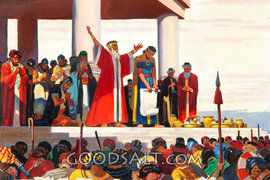Was King David worshipped alongside God?
- Mario Espinosa

- Sep 27, 2020
- 3 min read

Professing Christian groups such as the Jehovah's Witnesses and the Armstrongism splinter groups of the former Worldwide Church of God that quote 1 Chronicles 29:20 from either the King James Version or the New King James Version of the Holy Bible as proof that King David was worshipped alongside God.
The Armstrongists use this verse to support their teaching that God has made it possible and permissible for humans (His creation that is made in His image) to be worshipped just as God is worshipped because those who are in Christ at His second coming will be resurrected to become God(s) and thus will be able to be worshipped by humans during the Millenium.
The Jehovah's Witnesses use this verse to support their teaching that Jesus is a created being and is not worthy of worship in the same manner that God is worshipped. They teach that David was worshiped to a lesser degree than God and therefore Jesus can also be worshipped to a lesser degree than God in the same way that King David was.
Now here is an excerpt from an article entitled '1 Chron. 29:20, is Jesus worshiped the same way David was?' that was written by Matt Slick of the Christian Apologetics & Research Ministry (CARM), which I believe does an excellent job of refuting the idea that King David was worshipped alongside God.
Matt Slick writes the following:
"First of all, 1 Chron. 29:20 obviously cannot mean that David was worshiped equally with God. This would be blasphemy. Therefore, it is best to translate the Hebrew word shachah as "pay homage" or "bow down" as is attested to by other translations.
"Then David said to all the assembly, "Now bless the Lord your God." And all the assembly blessed the Lord, the God of their fathers, and bowed low and did homage to the Lord and to the king," (NASB).
"Then David said to the whole assembly, "Praise the LORD your God." So they all praised the LORD, the God of their fathers; they bowed low and fell prostrate before the LORD and the king," (NIV).
"Then David said to all the assembly, "Now bless the Lord your God." So all the assembly blessed the Lord God of their fathers, and bowed their heads and prostrated themselves before the Lord and the king," (NKJV).
"Then David said to all the assembly, "Bless the Lord your God." And all the assembly blessed the Lord, the God of their fathers, and bowed their heads and paid homage to the Lord and to the king," (ESV).
Is it legitimate to translate the verse this way? Yes it is because it is consistent with Hebrew dictionaries which tell us that the word shachah can mean worship, bow down, obeisance, reverence, fall down, crouch, prostrate oneself, (Enhanced Strong's Lexicon, (Oak Harbor, WA: Logos Research Systems, Inc., 1995.) See the same thing stated in The Abridged Brown-Driver-Briggs Hebrew-English Lexicon of the Old Testament, Richard Whitaker, Editor, (Oak Harbor, WA: Logos Research Systems, Inc., 1997). This would easily demonstrate that David was not being worshiped. Instead, homage was being paid to him as was also being paid to God--though, of course, there is no confusion about who is God and who is not. As if that weren't enough, the Jehovah's Witnesses own New World Translation translates the Hebrew word shachah in 1 Chron. 29:20 as "prostrate."
"And David went on to say to all the congregation: "Bless, now, Jehovah YOUR God." And all the congregation proceeded to bless Jehovah the God of their forefathers and bow low and prostrate themselves to Jehovah and to the king," (NWT).
Therefore, the Jehovah's Witnesses own Bible recognizes that King David, though greatly revered by the people, was not worshiped. Instead, both God and David were revered by the people by prostration and not worship."
(End excerpt)
The Holy Bible clearly shows that the Lord God, the Almighty, who has revealed Himself as three coequal and coeternal Persons and described in the Holy Scriptures as the Father, the Son - Christ Jesus, and the Holy Spirit; that He alone is holy and that He alone is worthy of worship (to praise, to extol, to exalt, to give honor to, to give glory to, and to pray to).
Exodus 20:3-6; Deuteronomy 5:7-10; Matthew 4:10; Revelation 4:8-11; Revelation 15:4.









Comments